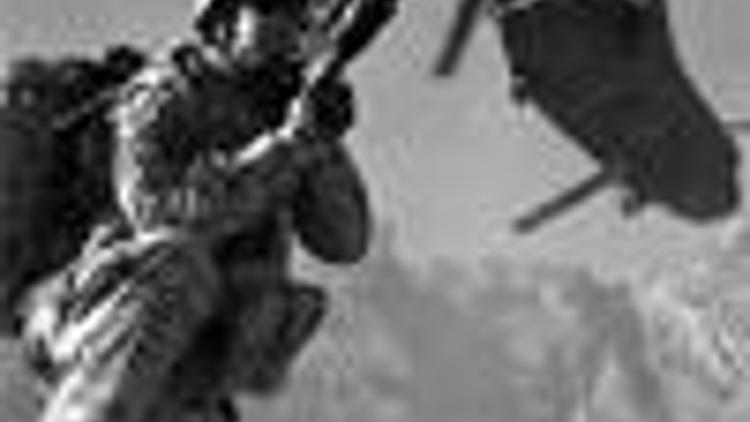US presses NATO for Afghan troops
Güncelleme Tarihi:

AP
Oluşturulma Tarihi: Şubat 20, 2009 00:00
KRAKOW, Poland - US presses NATO allies for more troops and financial assistance in Afghanistan after President Barack Obama decides to send additional US troops to the troubled country to combat growing insurgency. NATO must shoulder more of the load, says US secretary of defense
NATO members faced a daunting list of problems yesterday at the start of a defense ministers' meeting, including a U.S. push for more soldiers in Afghanistan. Heading into the two-day gathering, U.S. Defense Secretary Robert Gates said he had largely given up hope that NATO countries - many with strong anti-war constituencies at home - would be willing to commit more troops to Afghanistan. Instead, Gates said he would stress the need for help later this spring and summer to counter militants and improve security for planned elections there, something NATO officials have already said would require 10,000 reinforcements.
He floated the idea of more nonmilitary expansion, such as training Afghan police and deterring opium growers. "I hope that it may be easier for our allies to do that than significant troop increases," Gates said.
Besides the need to enhance security before this summer's electoral campaign, NATO allies also will be expected to contribute training teams to work with the Afghan security forces. They will be expected to provide more financial assistance to the cash-strapped government in Kabul and to supply additional military equipment to the Afghan army, which is being expanded from 80,000 to 130,000 troops.
In Afghanistan, Taliban guerrillas have made significant gains against the faltering government of President Hamid Karzai over the past two years and now control vast swaths of countryside. This week, Washington announced it would send extra 17,000 soldiers there to strengthen the 65,000-strong international military presence.
Meanwhile, NATO's secretary-general yesterday called for a new doctrine to meet challenges the alliance's founders did not anticipate, such as terrorism, cyber attacks and the effects of climate change.
New dangers
Jaap de De Hoop Scheffer said NATO would have to take into account new dangers like computer hackers, disruptions to energy supplies and the possible consequences of melting Arctic ice caps. "A cyber attack does not require a single soldier to cross another nation's border yet it can paralyze much of a country's ability to function," he said. De Hoop Scheffer said the alliance remains guided by a Europe-centric concept that "does not take into account many of the key political and security events of the early 21st century" - notably the Sept. 11 attacks and the mission in Afghanistan.
Meanwhile, Gates also commented on Washington’s upcoming relations with Russia before he flew to Europe for NATO gathering and said he sees a chance for better relations with Russia with a new president in the White House, but warned that Moscow is trying to "have it both ways" by offering help in Afghanistan and undermining U.S. efforts there at the same time.
"I am hopeful that with a new start that maybe there are some opportunities with the Russians that we can pursue," Gates said. The lone holdover from the Cabinet of George W. Bush, Gates added caveats to his once ample support of the missile defense plan. The idea was a favorite of Bush's, but Obama wants to make sure the system is reliable and doesn't detract from other security priorities.
He floated the idea of more nonmilitary expansion, such as training Afghan police and deterring opium growers. "I hope that it may be easier for our allies to do that than significant troop increases," Gates said.
Besides the need to enhance security before this summer's electoral campaign, NATO allies also will be expected to contribute training teams to work with the Afghan security forces. They will be expected to provide more financial assistance to the cash-strapped government in Kabul and to supply additional military equipment to the Afghan army, which is being expanded from 80,000 to 130,000 troops.
In Afghanistan, Taliban guerrillas have made significant gains against the faltering government of President Hamid Karzai over the past two years and now control vast swaths of countryside. This week, Washington announced it would send extra 17,000 soldiers there to strengthen the 65,000-strong international military presence.
Meanwhile, NATO's secretary-general yesterday called for a new doctrine to meet challenges the alliance's founders did not anticipate, such as terrorism, cyber attacks and the effects of climate change.
New dangers
Jaap de De Hoop Scheffer said NATO would have to take into account new dangers like computer hackers, disruptions to energy supplies and the possible consequences of melting Arctic ice caps. "A cyber attack does not require a single soldier to cross another nation's border yet it can paralyze much of a country's ability to function," he said. De Hoop Scheffer said the alliance remains guided by a Europe-centric concept that "does not take into account many of the key political and security events of the early 21st century" - notably the Sept. 11 attacks and the mission in Afghanistan.
Meanwhile, Gates also commented on Washington’s upcoming relations with Russia before he flew to Europe for NATO gathering and said he sees a chance for better relations with Russia with a new president in the White House, but warned that Moscow is trying to "have it both ways" by offering help in Afghanistan and undermining U.S. efforts there at the same time.
"I am hopeful that with a new start that maybe there are some opportunities with the Russians that we can pursue," Gates said. The lone holdover from the Cabinet of George W. Bush, Gates added caveats to his once ample support of the missile defense plan. The idea was a favorite of Bush's, but Obama wants to make sure the system is reliable and doesn't detract from other security priorities.

